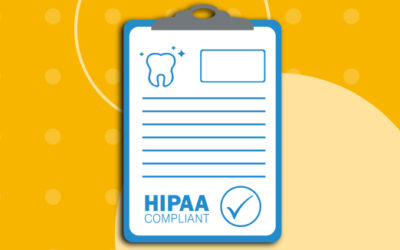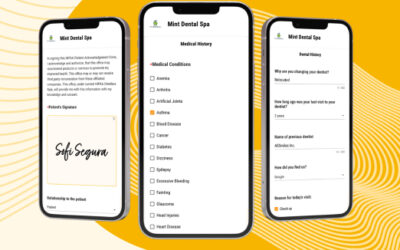
Collecting and maintaining accurate dental patient history is vital for any dental practice since several medical conditions are closely linked to oral health concerns. A perspective by Frontiers based on research findings states that integrating records of a patient’s medical and dental history is essential for effective treatments.
College of General Dentistry also emphasizes the importance of carefully gathering and checking patient data before treatment. You must understand patient needs and take note of medical conditions, treatment history, allergies, and consumption of reactive drugs. It ensures better treatment outcomes and protects against legal issues.
Electronic forms make the data collection process simpler and more manageable. A secure and organized platform helps appropriately store and track patient records. Reducing the chances of human error allows you to provide accurate and timely oral care.
This article explains how to use electronic forms to collect and maintain dental patient histories efficiently.
The Benefits of Collecting and Maintaining Dental Patient History Electronically
Collecting and maintaining dental patient history forms help dental practices speed up operations. It is a critical dental practice management task that helps streamline workflow to spend more time on patient care.
In addition, collecting a patient’s medical history is vital to ensure the proper treatment.
Traditionally dental patient history is gathered through paper-based forms. However, electronic dental patient history forms are becoming increasingly popular, with around 73.8% of dental practitioners using computers for patient information management. They reduce time and resources spent on paperwork while ensuring improved accuracy.
Electronically collecting and maintaining patient history is also beneficial for patients. It allows them to complete their medical form online according to their comfort. They do not need to wait for paperwork at the dentist’s office before their appointment.
Furthermore, electronic patient history forms make storing and retrieving information easier, improving data security and portability.
By shifting from traditional paper-based processes to an electronic system, dental practices can realize the following benefits:
-
Cost Savings
Electronic patient history collection maintenance eliminates the need for costly office supplies such as paper and ink cartridges used in traditional paper-based systems.
Experts estimate savings of up to $6,000 per year by cutting down 50% of your paper-based documentation.
Physical storage space is no longer needed when records are stored electronically. Therefore, it reduces overhead costs associated with document management and storage.
Furthermore, electronic patient history collection reduces the need for manual data entry. It also makes it easier for staff to search patient details than physical patient files. Therefore helps by saving time and money spent on administrative tasks.
-
Time Savings
Electronic systems reduce the time necessary for record-keeping tasks such as filing forms, submitting claims, and tracking payments. In addition, they support automated data collection to streamline processes and free up staff for enhanced patient care.
Additionally, paperless systems prevent paperwork-related waiting time at the dental clinic. It prevents delays by eliminating the need for manual record searches.
In response to a survey by Clinical Medicine & Research (CM&R), 65% of dentists believe EDRs improve the efficiency of their dental staff while 37% say it consumes less time compared to paper-based documentation.
You can also use the data for automated scheduling on real-time dentist availability. In addition, patient reminders can be sent electronically, saving time on phone calls and emails.
-
Minimize Compliance Risks
Ensuring compliance is a significant concern when collecting and gathering dental patient data. You must comply with the Health Insurance Portability and Accountability Act (HIPAA) and other industry regulations governing the storage and sharing of sensitive patient information.
Electronically collecting and maintaining dental patient history ensures data security. In addition, using HIPAA-compliant software with encryption protocols helps secure Protected Health Information (PHI), minimizing potential compliance risks.
Digital tools improve compliance through restricted access and full audit trails. It keeps your patients at ease and their data secure.
Which Dental Patient Forms Can Be Signed Electronically?
Digital dental patient forms significantly reduce the time spent filling and maintaining paper-based forms. Besides streamlining paperwork, it reduces wait times and improves patient satisfaction with optimal care.
The following dental patient forms can be signed electronically:
- Patient Information Forms collect basic information about the patient, such as their demographics and contact information.
- Medical History Forms contain the details of a patient’s medical record that are typically updated annually, including general health conditions, allergies, ongoing medications, and past treatments.
- Dental History Forms provide information about a patient’s dental history, such as previous treatments, x-rays, outcomes, oral hygiene, brushing habits, and other factors that may contribute to their dental care, like diet.
- Consent Forms give the patient a detailed understanding of the proposed dental treatment procedure and seek their consent. Digital patient consent forms also include a section for the patient to add their e-signature, acknowledging they accept the terms of the form and a signature area for the dentist or provider.
- Insurance Forms are used to obtain details of the patient’s insurance policy. Dentists can use the information to submit claims accurately and efficiently.
- HIPAA Privacy Acknowledgement Forms certify that the dentist complies with HIPAA privacy regulations and that patients understand and agree to share their Protected Health Information (PHI) to receive treatment from their dentist.
Patients can fill digital dental forms securely from any device. It eliminates the back-and-forth of paper-based forms, enhancing the efficiency of your dental practice.
How to Collect Patient History Using Dental Forms?
Collecting dental patient history using digital dental forms helps to diagnose and treat oral health issues by ensuring secure and optimal communication between patients and dentists.
Using software for collecting patient information allows dentists to enter a patient’s medical history automatically into their Electronic Health Record (EHR) systems, commonly known as Practice Management Software (PMS).
Electronic records are easy to access and update. Furthermore, unlike paper forms, electronic patient forms can be personalized for each patient, which helps make the process even more efficient.
Yapi is a dental software offering tools like digital dental patient history forms that provide an easy and safe way to collect patient information. They are customizable according to patient and practice needs. Most importantly, the signed digital forms are imported and stored safely in the practice management software, and medical alerts are updated automatically.
You can send the forms to your patients via text message or email, and your team can also provide convenient options in-office to sign forms on a tablet like an iPad or any computer. Besides being HIPAA-compliant, the platform facilitates the exchange of sensitive data between patients and healthcare providers.
Yapi Dental forms can collect the following patient information:
- Patient Information – Patient details such as the patient’s full name, social security number, address, and contact number are helpful for identification. Demographic information such as gender, family status, and date of birth helps make treatment decisions. Additionally, accurate insurance details like insurance provider and policy numbers help file claims for timely payment.
- Medical History – Collect detailed medical information, including any previous medical treatments, earlier diagnoses, surgeries, and hospitalizations. The medical conditions and allergies should match the medical alerts in your database with options for patients to add a free response option that might not be as common. Particulars of dietary habits, including consumption of alcohol, tobacco, or other drugs, can also be gathered. You can also collect pregnancy status, birth control medication, and nursing information.
- Insurance Information – Obtain each patient’s primary insurance coverage details and secondary coverage when relevant. It includes the insurance company name, policyholder information, subscriber ID, group name, and the ability to include a photo of the front and back of insurance ID cards. Optionally, this information can be captured for the first time for new patients who schedule online to ensure you accept their insurance.
How to Maintain Patient History Using Dental Forms?
The data collected through the electronic dental forms is imported to the existing practice management software, and with Yapi, data is also visible in a secure web app.
You can access patient health and the most important contact information under their Summary tab. It usually displays the following information:
- Patient name
- Contact information (email, mobile/home/work phone)
- Family members
- Medical conditions, allergies, and medications
Complete insurance information is viewable as well.
Some patient dental forms will require annual review by your patients, and they will pre-populate existing information to make the process faster and minimize errors. These forms, like a medical history update, can be sent to patients in advance to maximize your in-office chair time and reduce time spent in the waiting area for paperwork.
Final Thoughts
In conclusion, dental forms are crucial in helping dentists understand their patients’ overall health, enabling them to make the best treatment decisions, and the reliance on paper forms is outdated.
Electronic dental forms offer a convenient and efficient way to gather and update patient information in real-time. This streamlines workflows and reduces dental offices’ carbon footprint on the environment. With Yapi’s feature-rich platform for building and maintaining digital dental forms, dentists can embrace a more efficient and accurate approach to patient history.
So, let’s say goodbye to the mountains of paperwork and welcome a brighter, more eco-friendly future for dental practices!
Yapi offers the following:
- The intuitive user interface makes creating, editing, and customizing forms easy.
- Automated sync of patient data and signed PDFs to your practice management software
- Ability to send digital forms to patients via text, email, or in-office and securely collect patient data
- Quick collaboration across teams for better patient care and outcomes.
- The ability to securely view patient data with real-time accessibility through a web application
Yapi makes collecting and maintaining patient information easy through electronic dental patient history forms. Modernize your dental office with Yapi’s dental patient forms.


